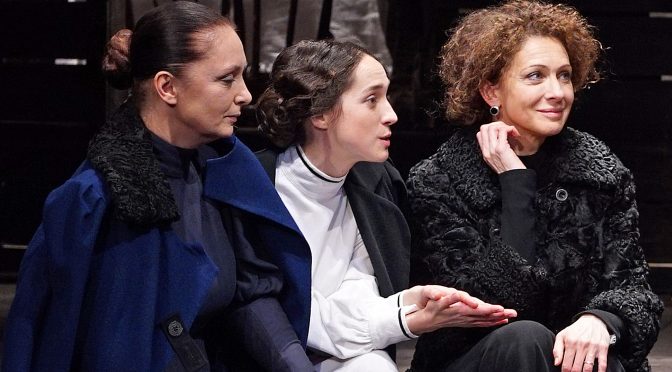The world-renowned Maly Drama Theatre of St Petersburg and its director Lev Dodin have a phenomenal reputation. The company’s visits to London are anticipated events for theatre aficionados and, with only ten performances this time around, you should hurry to get a ticket. Maly’s work is an example of high expectations fulfilled, and this production of Chekhov’s classic does not disappoint.
Dodin and his talented cast of performers (embedded in the company in a fashion that’s rare in the UK nowadays), create the perfect mix of melancholy and humour. Initially it is the comedy that stands out – a combination of looks that are laugh-out-loud funny and a subtle appreciation of the play’s more ridiculous moments. It feels surprisingly light at times, confident and relaxed, despite the surtitles ruining some of the jokes.
This Three Sisters is very much Irina’s play and not just because of the masterful performance from Ekaterina Tarasova, who takes the role. Irina is full of energy and promise, Tarasova appropriately captivating and funny. The younger sibling has all the men from the local regiment courting her and is amusingly contemptuous. Her despair at rural life is allowed to grow convincingly – it starts off almost sweet, so that it becomes a real tragedy rather than just a trope.
This play of unfulfilled dreams and desires has plenty of painful moments. Masha’s adultery with the philosophising Vershinin is made into a passionate affair, with Ksenia Rappoport revealing a palpable mania within the character that makes her performance exciting. As for the eldest of the trio, Olga’s career as a school teacher develops into a case of genuine despair (often a tough ask) with a brilliant performance from Irina Tychinina. Her metamorphosis into a formidable figure by the finale – where she seems frozen, rigid with disappointment – is truly commanding.
That the characters change so much during the play is one of Dodin’s key insights, illustrated by the skilled performances he has nurtured (special note has to be made of Stanislav Nikolskiy’s Soleni, whose transformation by the final scene is stunning). The action takes place over four years, after all, and highlighting this gives the piece great momentum. In this potentially static play (there’s an awful lot of looking out of windows), Dodin carefully adds a sense of action. Even Alexander Borovsky’s set – an outline of the Prozorov home – moves, advancing towards us as tension mounts. Action creeps into the audience with steps leading into the stalls.
Dodin’s appreciation of Chekhov’s rhythm is clear, the balance he injects precise and controlled without feeling forced. There’s no doubt that there is a master in our midst. The production is a fantastic chance to see a superb director at work.
Until 29 June 2019
Photo (c) MDT

